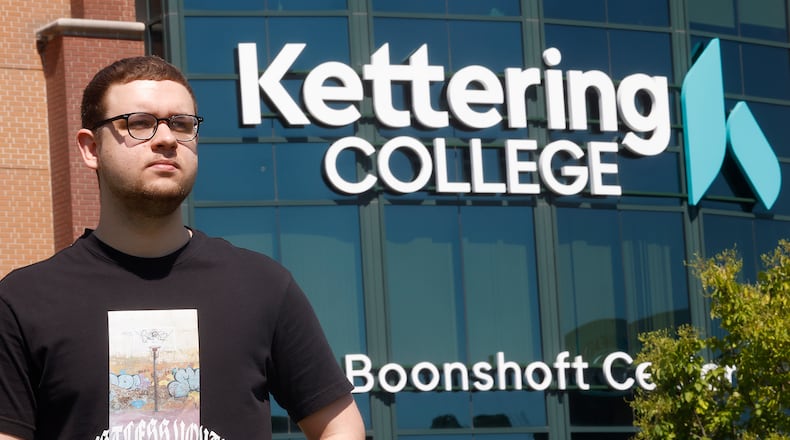For Malishevskyi and about another 30 Ukrainian students, this meant leaving their families, unsure of when they might see them again, to come to Kettering after Kettering College wanted to find a way to help some of their counterparts in Ukraine.
“The war had started. I finished my high school, and I started studying at the local university in my area where I live, and I heard about the opportunity to study in the Kettering College in my local church,” Malishevskyi said.
Since the war was going on, his parents and he decided it would be better for Malishevskyi to study in the U.S., he said.
When Russia first invaded Ukraine, it wasn’t that dangerous at that time where he lived in the middle of the country since most of the fighting was taking place in the east, Malishevskyi said.
“I was 16 at the moment, and then you are 16 and you realize that war is going on in your country. It’s scary,” Malishevskyi said.
The initiative to bring in students from Ukraine to study at Kettering College began in March 2022, right on the heels of the invasion, said Nate Brandstater, president of Kettering College.
The Seventh-day Adventist Church operates 24 schools in Ukraine, including a seminary and college, Brandstater said.
“The seminary and the college are in Bucha, and of course Bucha was overrun quickly,” Brandstater said.
Russian troops occupied Bucha, a suburb of Kyiv, for all of March 2022, after which Ukrainian forces uncovered more than 400 people dead, according to the Associated Press.
“Everyone was scattered,” Brandstater said.
With many people displaced and their lives disrupted, the Grand Conference of the Seventh-day Adventist Church asked its counterparts in North America if anyone could take in and host students, he said.
“I immediately connected with Kettering Health leaders with that question, and the response was overwhelmingly positive,” Brandstater said. “I was tasked with implementing that commitment to supporting Ukraine and its students.”
They came across challenges of getting student transcripts and student visas to the U.S., he said.
“The embassy was shut down, so they had to go out of the country to get student visas,” Brandstater said.
That created problems for some of the young men in the group who wanted to come to Kettering College as men typically aren’t allowed to leave Ukraine due to mandatory military service. Earlier this year, Ukraine lowered its draft-eligible age for men from 27 to 25.
Malishevskyi, who is 18 now, can’t visit his family over the school’s summer holiday due to concerns he would not be allowed to return to the U.S., like other male students in the group, he said.
“There were a whole lot of things that we needed to learn and get really good at, really fast, and it seemed like every time we encountered a challenge, we were blessed and able to overcome it,” Brandstater said.
The Dayton Foundation recently helped with one of those challenges, awarding Kettering College $25,000 for their Ukrainian Student Humanitarian Support project to cover food expenses for the 34 Ukrainian students at Kettering College.
“What I’m really excited about is the blessing that this group of of trained health care professionals is going to be on, not just this community, but also on Ukraine. The needs for rebuilding in Ukraine, including health care services, is going to be overwhelming,” Brandstater said.
Malishevskyi is among the students who hopes to stay in the U.S.
“I love this country, and if there is any possibility to stay here...I would love to,” Malishevskyi said.
About the Author

